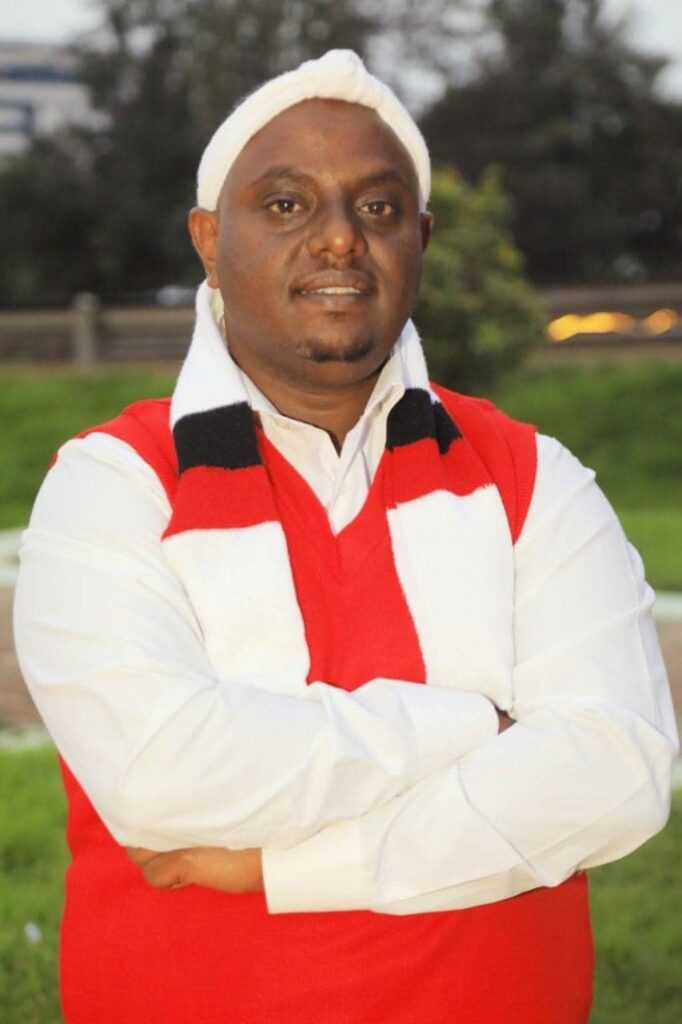OLLAA has received credible reports from the Addis Standard and Oromia 11 regarding the arbitrary arrest and subsequent disappearance of Henok Dejene.
Henok Dejene is a career civil servant and a father to three children. He and his family live in Finfinne, where he works to advance the development of Oromoo culture and norms through the organization he co-founded, the Finfinne Renaissance Association.
Unfortunately, on 10 July 2022, Henok Dejene joined the long list of Oromoo advocates and activists detained or otherwise harassed by government officials. According to his wife, Mrs. Hiwot, on that day, two visitors dressed in civilian clothing approached their home; when asked who they were, the visitors showed identification that proved them to be government security officials. At this time, these officials remanded Mr. Henok into custody without giving any legal justification to the detained or to his family.
Following his arrest, Mr. Henok was taken to the police station near Adwa Bridge in Finfinne The government officials then returned to the family home, accompanied by several police officers, and began to search the premises. While conducting this search, the officers found an Oromo Liberation Front (OLF) flag–which was logged as an Oromo Liberation Army (OLA) flag by the police–and a photograph of notable Oromoo rights activist Jawar Mohammed. Both of these items were taken by the security officials.
Mr. Henok was then transferred to the police station in Yeka Woreda 07 and his family was told he was scheduled to before the Lideta Court on July 12, 2022, however, he was not brought to court on that date. . When his family went to the police station the following day, they were told that he had been taken to Abba Samuel Prison the previous evening. Upon arriving at Abba Samuel prison, his family was told that he hebeen taken to Awash 7. Awash is a detention facility located just over 200km from his home in Finfinne and the court before which he was supposed to appear. Currently, Mr. Henok’s whereabouts are unknown to his family and colleagues.
The arrest of Mr. Henok Dejene raises many questions about the legality of police and government actions against Oromos. Furthermore, this situation raises concerns about the due process–which is a protected right under the constitution of the Federal Democratic Republic of Ethiopia–being afforded to Oromoo detainees. The absence of Mr. Henok from his initial court hearing has been overshadowed by the lack of clear information about his current whereabouts. Fearing the worst, Mrs. Hiwot and the rest of their family are left uncertain not only of his whereabouts but about his physical well-being as well.

International Law
The importance of the African Charter on Human and People’s Rights is well known throughout international law and Ethiopia, as a State party, has a duty to apply it. Article 6 of this convention highlights the prohibition of arbitrary arrests or detentions. The two government security officials, who came in civil clothes to arrest him, without any explanations nor an arrest warrant, denied this right to Mr. Hiwot. This right is also put forward in Article 9 of the International Covenant on Civil and Political Rights, and thus must be applied in any country which has ratified it.
Also, as noted in paragraph 3 of the same Article, individuals who have been deprived of their liberty have a right to be brought before a judge or court of law within a reasonable period of time following their arrest. Despite these provisions, state officials failed to bring Mr. Henock to court within the time prescribed by law (which according to the Ethiopian Constitution is 48 hours following their arrest), and instead transferred him to another prison. No one has heard from him afterwards, which is contrary to Article 17 of the ICCPR, which states that “No one shall be subjected to arbitrary or unlawful interference with his privacy, family, home or correspondence”, and article 21 of the Ethiopian Constitution, which states that all persons held in custody, “shall have the opportunity to communicate with, and to be visited by, their spouses or partners, close relatives, friends, religious councillors, medical doctors and their legal counsel.”

